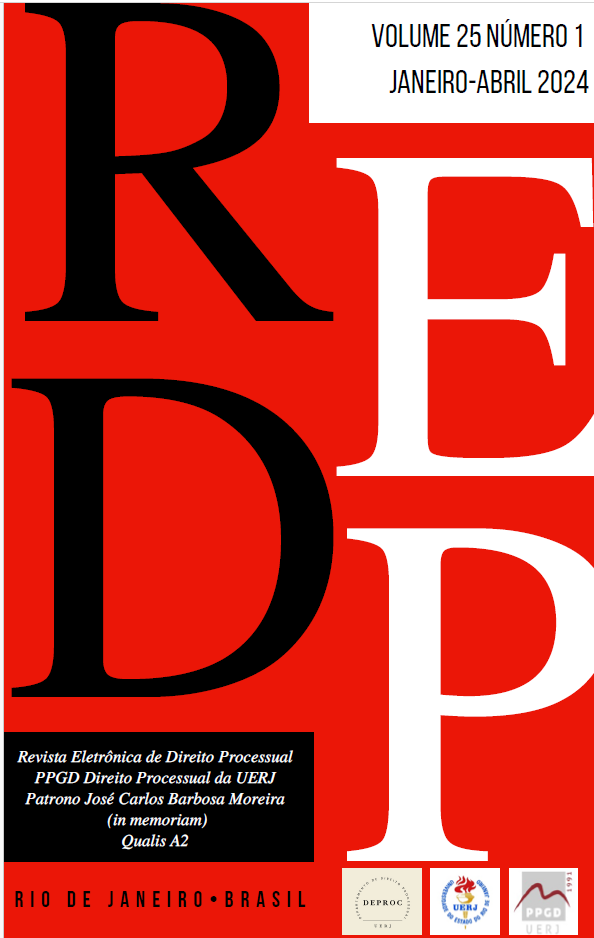A TEORIA DA DERROTABILIDADE DAS NORMAS JURÍDICAS E OS SEUS INFLUXOS NO SISTEMA BRASILEIRO DE PRECEDENTES JUDICIAIS
DOI:
https://doi.org/10.12957/redp.2024.81918Resumo
O presente artigo se propõe a analisar a possibilidade de a teoria da derrotabilidade das normas jurídicas ser utilizada pelo operador do direito para afastar a aplicação de um precedente judicial com força vinculante. Para implementar essa análise, apresentou-se o conceito de precedente judicial, suas nuances no ordenamento jurídico brasileiro em contraposição à tradição jurídica do common law, bem como a graduação da sua força vinculante. A partir dessas concepções introdutórias, prosseguiu-se avaliando a aproximação do precedente judicial com a essência das normas jurídicas, destacadamente pelos aspectos da generalidade e abstração. Adiante, verificado o caráter normativo, analisou-se os limites a serem observados na formação dos precedentes judiciais, sobretudo à luz da compreensão de que a atividade jurisdicional é criativa da norma jurídica, utilizando-se como norte para essa investigação acórdãos do Supremo Tribunal Federal que, em controle concentrado de constitucionalidade, invalidaram súmulas da jurisprudência do Tribunal Superior do Trabalho. Ainda, foi estabelecido um contraponto entre os precedentes com a legitimidade da reação legislativa, considerando a ambivalência entre a autocontenção e a função contramajoritária da Suprema Corte. Em seguida, avaliou-se o enquadramento dos precedentes às espécies normativas tradicionais – regras e princípios –, ocasião na qual foram identificados os conceitos apresentados pelas doutrinas nacional e estrangeira, em articulação com as particularidades da ratio decidendi e com o objetivo uniformizador da jurisprudência. Destarte, compreendidos os precedentes obrigatórios como regras elaboradas pelo Poder Judiciário, o estudo prosseguiu com o enfrentamento do tema a partir da teoria da derrotabilidade das normas jurídicas, apresentando-se uma breve contextualização história quanto a sua origem, o seu conceito, a compreensão da doutrina e o seu diálogo com o objeto da pesquisa. Também, na perspectiva do caráter normativo do precedente, inspecionou-se as sistemáticas aplicáveis ao distinguishing e ao overruling, definindo cada uma dessas técnicas no contexto da superação das regras. Ao final observou-se que as teses jurídicas consolidadas nos precedentes judiciais são incapazes de esgotar todas as possibilidades relacionadas à questão de direito de que tratam, a semelhança do que ocorre com as leis elaboradas pelo Poder Legislativo. Concluiu-se que a teoria da derrotabilidade pode ser excepcionalmente utilizada para justificar a não observância de tese firmada em precedente vinculante, em especial quando demonstrada a exceção implícita, sem que isso possa comprometer a estabilidade, integridade e coerência da jurisprudência.
Downloads
Publicado
Como Citar
Edição
Seção
Licença
Copyright (c) 2024 Roberto de Aragão Ribeiro Rodrigues, Augusto Paiva Siqueira

Este trabalho está licenciado sob uma licença Creative Commons Attribution 4.0 International License.
Todos os artigos publicados na Revista Eletrônica de Direito Processual (REDP) (Departamento de Direito Processual, Universidade do Estado do Rio de Janeiro, Brasil) são licenciados por meio de uma Licença Creative Commons - Atribuição 4.0 Internacional (CC BY 4.0).
Os autores retêm os direitos autorais de seu artigo e concordam em licenciar seu trabalho com a licença CC BY 4.0, aceitando assim os termos e condições específicos desta licença disponíveis no seguinte website: https://creativecommons.org/licenses/by/4.0/legalcode.
- Os autores concedem à REDP o direito de primeira publicação, de se identificar como publicadora original do trabalho e concedem à revista uma licença de direitos não exclusivos para utilizar o trabalho das seguintes formas: Reproduzir, vender e distribuir cópias eletrônicas ou impressas do manuscrito como um todo, de partes específicas do manuscrito e de suas traduções para qualquer idioma;
- O uso do artigo por terceiros é livre, contanto que a integridade da publicação seja mantida e seus autores originais, periódico de primeira publicação e detalhes de citação sejam identificados.
Dentro dos termos da licença, os autores podem entrar em acordos contratuais adicionais separados para a distribuição não exclusiva da versão publicada do trabalho na revista.
Copyright and Licensing
All articles published in the Procedural Law Electronic Review (REDP) (Department of Procedural Law, State University of Rio de Janeiro, Brazil) are licensed under a Creative Commons License - Attribution 4.0 International (CC BY 4.0).
- Authors retain copyright to their article and agree to license their work under the CC BY 4.0 license, thereby accepting the specific terms and conditions of this license available at the following website: https://creativecommons.org/licenses/by/4.0/ legal code.
- Authors grant REDP the right of first publication, to identify itself as the original publisher of the work, and grant the journal a non-exclusive license to use the work in the following ways: Reproduce, sell and distribute electronic or printed copies of the manuscript as a whole, of specific parts of the manuscript and its translations into any language;
- Use of the article by third parties is free, as long as the integrity of the publication is maintained and its original authors, first publication journal, and citation details are identified.
Within the terms of the license, authors may enter into separate additional contractual agreements for the non-exclusive distribution of the published version of the work in the journal.




